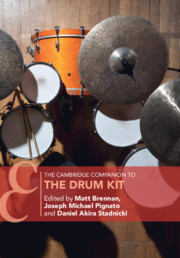Book contents
- The Cambridge Companion to the Drum Kit
- Cambridge Companions to Music
- The Cambridge Companion to the Drum Kit
- Copyright page
- Contents
- Figures
- Tables
- Music Examples
- Notes on Contributors
- Introduction
- Part I Histories of the Drum Kit
- Part II Analysing the Drum Kit in Performance
- Part III Learning, Teaching, and Leading on the Drum Kit
- Part IV Drumming Bodies, Meaning, and Identity
- 14 The Meaning of the Drumming Body
- 15 Disability, Drumming, and the Drum Kit
- 16 Seen but Not Heard
- 17 Building Inclusive Drum Communities
- 18 A Window into My Soul
- Index
18 - A Window into My Soul
Eudaimonia and Autotelic Drumming
from Part IV - Drumming Bodies, Meaning, and Identity
Published online by Cambridge University Press: 28 May 2021
- The Cambridge Companion to the Drum Kit
- Cambridge Companions to Music
- The Cambridge Companion to the Drum Kit
- Copyright page
- Contents
- Figures
- Tables
- Music Examples
- Notes on Contributors
- Introduction
- Part I Histories of the Drum Kit
- Part II Analysing the Drum Kit in Performance
- Part III Learning, Teaching, and Leading on the Drum Kit
- Part IV Drumming Bodies, Meaning, and Identity
- 14 The Meaning of the Drumming Body
- 15 Disability, Drumming, and the Drum Kit
- 16 Seen but Not Heard
- 17 Building Inclusive Drum Communities
- 18 A Window into My Soul
- Index
Summary
In this autoethnographic essay, the author – a drummer – describes how he derives meaning from playing the drum kit. He presents accounts of playing drums both alone and in the context of an original rock band. Drawing from existing scholarship on aesthetic experience and meaning in music making, the author argues that while he plays drums often in a state of flow, it may be unhelpful to construe this – as others have done – as music making for its own sake. Rather than positioning his drumming as autotelic or intrinsically worthwhile, the author explains how he plays for the fulfilment derived therefrom, as part of a life lived in search of eudaimonia – flourishing both individually and as part of a community. Drumming in these contexts is, the author argues, a locus of spirituality, understood through the lenses of embodiment, authenticity, and personal agency as a form of success. Playing drums – for this drummer – provides a connection to, and a window into, his soul.
- Type
- Chapter
- Information
- The Cambridge Companion to the Drum Kit , pp. 248 - 258Publisher: Cambridge University PressPrint publication year: 2021

